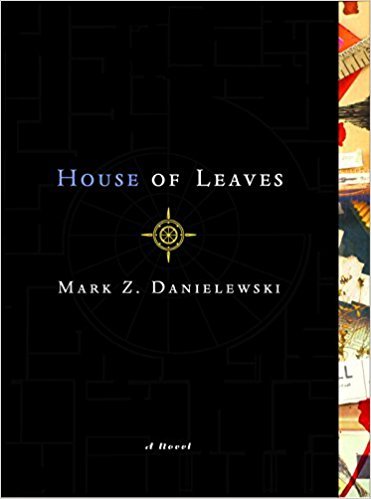House of Leaves (Saturday Book Club)
House of Leaves (2-Color Edition) by Mark Danieliewski
I’ve read House of Leaves several times, and every time when I reach the end, stumbling through the “Three Attic Whalestoe Letters” and “Pelican Poems”, I am reminded of “Jabberwocky” by Lewis Carroll, or more accurately, Alice’s reaction to it in Through The Looking Glass, “Somehow it seems to fill my head with ideas – only I don't exactly know what they are!"
I will admit that I like some of his stylistic choices. I like the double-frame of the story, how at times he’ll use six pages to convey one sentences to show the severity of the event. There are beautiful images within, such as Navidson trapped on a small platform in an infinite void, reading a book and burning pages he’d read to see the words, eventually burning the page he’s reading, forcing him to read faster and faster. Yet at the end of the book, at the end of the day, I am still one of the readers who will never “get it”.
One of the things I learned about writing when I was going to SUNY Oswego is that a writer makes a contract with the reader, a series of promises about the format, what will be revealed, what the general plot of the story will be. When you present the idea of a monster, eventually you have to have a final confrontation with the monster, or at least learn who or what it is. The persistent monster in all three of the stories in House of Leaves is the Minotaur, which never appears, only leaving traces of itself in a “wolf-at-the-door” sort of way (Which did work for “The Blair Witch Project”, though the film concentrated more on the breakdown of a group than voluntary isolation).
In short, the book feels more like a collection of scenes with avant-garde ideas rather than a cohesive story. This is why I’ll never “get it”, and why, to my detriment, I’ll never understand experimental fiction. I can appreciate the parallels between the book and the album Haunted by Poe (the author’s sister), and that both people are very open about discussing the book’s meaning with questioning fans, but shouldn’t a reader be able to understand the book without the author’s help? Should a book require more than one attempt to understand it, or at least understand the plot?
While I want my readers to read my books more than once, I don’t want them to do such because they have to in order to discover my artistic vision that was tucked in cryptically in the slogan of some coffee company on page 926-F that only becomes clear after seven to eight read-throughs. But then I suppose this is why I’m writing genre fiction instead of experimenting with the form.
If anything, the book makes me a better writer because I know I need to be aware of my audience and what exactly they’ll be expecting out my book. I’ll need to know what I can get away with, and which conventions I can twist and tweak to my purposes, but most importantly, I need to be aware of the line that I should not cross with them.
Posted from my blog with SteemPress : https://vaughndemont.com/2018/06/30/house-of-leaves-saturday-book-club/

To listen to the audio version of this article click on the play image.

Brought to you by @tts. If you find it useful please consider upvoting this reply.
Okay, stop doing this, seriously. Free text-readers are freely available, sound better, and wouldn't try to make money off of my work.
I've never read House of Leaves, but I've heard a lot about how experimental it is.
I think that when you experiment you're always competing against two things: the need to tell a good story (which is based on certain fundamentals) and the ability to try things that may be better than anything that has come before. Of course, the latter is fairly rare (and "better" can be incremental, not dramatic) but there's still a place to experiment. If nothing else, you learn what not to do.
Exactly. What got me about this one was the three different editions, and how all three had something different added to the story, and lined up with Poe's "Haunted" in different ways, which sounds clever until you realize Danieliewski was just doing the EA model before DLC and $150 collector's editions became the norm. To look back on it now, some scenes just feel so... pretentious, like reading the book while burning the pages he'd already read. It's a beautiful image... as long as you don't see the flaws. There were points I felt that the author was writing these scenes for nothing more than to be clever, you know?
Yeah, that's one of those things that always sort of rubs me the wrong way.
There's nothing wrong with being clever, but you don't want to be insufferably clever.